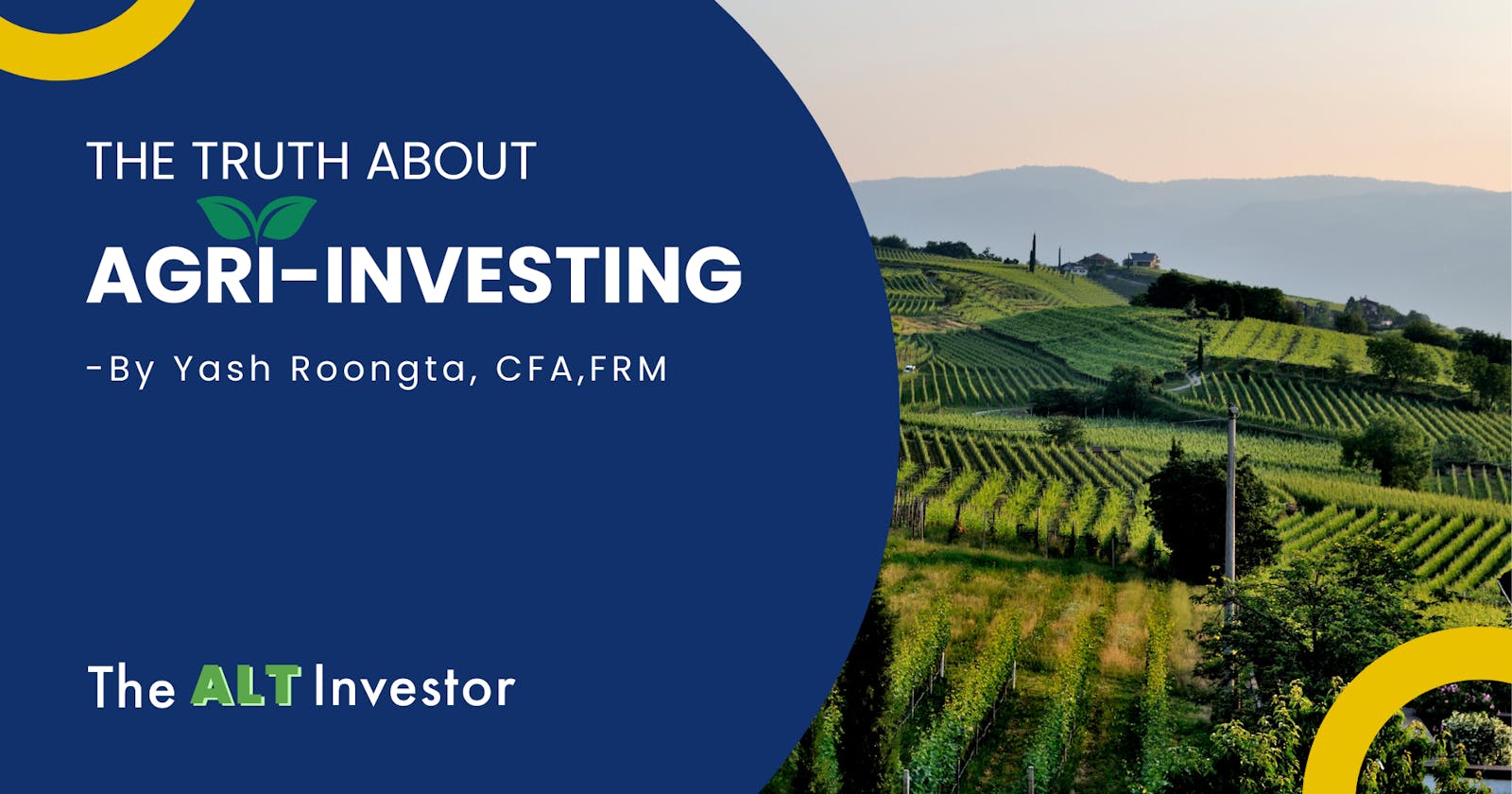The Truth About Agri-Investing: Is It Too Good to Be True?
High tax-free returns: don't let them deceive you!
Purchasing agricultural land as an investment opportunity has always been attractive to Indians. In fact, acquiring any type of real estate seems to be ingrained in our minds from birth. During the 1990s, when several agri-investing opportunities in teak and timber plantations emerged (also promoted as tax-free returns), people couldn't resist and invested over 500 crores, hoping to double their money within a few years.
One such fraud case was Anubhav Plantations which was termed The Great Plantation Scam of the 1990s by the Indian media. See the summary below and to read more, check this Wikipedia page.
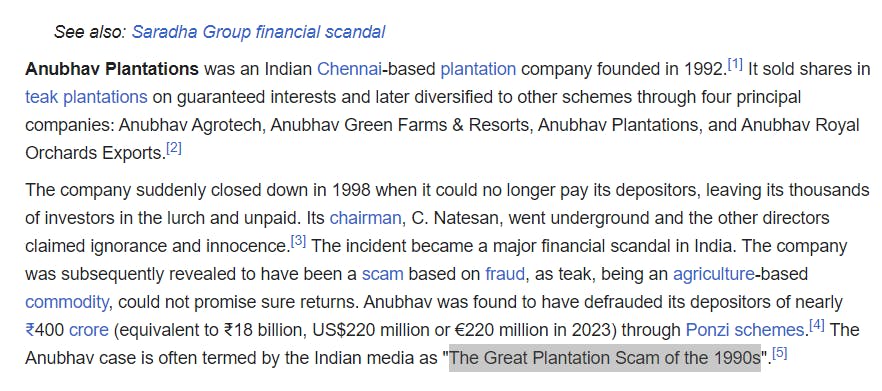
Sorry to set a negative tone at the start of this article, however, I felt it is important you know the history of such schemes before knowing the current situation of such investment opportunities.
Personal Experience with Agri-Investing Schemes
Just as stock markets are cyclical, I believe the appearance of such schemes in the market is also cyclical, albeit in a different form. This time, they emerged in a digital avatar, which made it easy for investors to quickly sign agreements on the company's mobile app or website and promptly transfer funds.
When such an opportunity came to my door in 2021 via a company called Growpital, I jumped in excitement as some of their plans were offering 20% fixed returns (via Sateeq) and that too TAX-FREE!! It was unheard of, quickly with excitement I called up my dad to take his advice from a taxation point of view (he is a Chartered Accountant) and he told me his personal experience of losing a good sum of money in such deals.
However, as a young person, you want to prove to your dad that this time it's different and that you might be smarter than him in detecting something fishy in such opportunities. But without conducting any significant due diligence, I invested in these deals anyway, driven by FOMO. Fortunately, I received my money (along with interest) back from where I had invested, but it still didn't feel right on how they could offer fixed returns on a commodity (agri-produce) that depends on so many external factors like weather, skills, economy, climate change, and so on. This prompted me to delve deeper into understanding how this model works. Let's explore more details below.
How does this scheme generally work?
Usually, an investor would invest money via an online agri-investing platform and sign an LLP (Limited Liability Partnership) agreement to become a partner in a special purpose vehicle (SPV). All money collected from the partners is then invested via SPV either to lease agricultural land or invested in agri projects directly.
The sale of agricultural produce from such leased land or projects is then distributed to investors (after deducting all operational costs like salary, rent, etc).
The return on investment is generally fixed and mentioned in the LLP agreement you sign at the beginning, so even if the LLP makes more profits, you only get fixed interest you signed for.
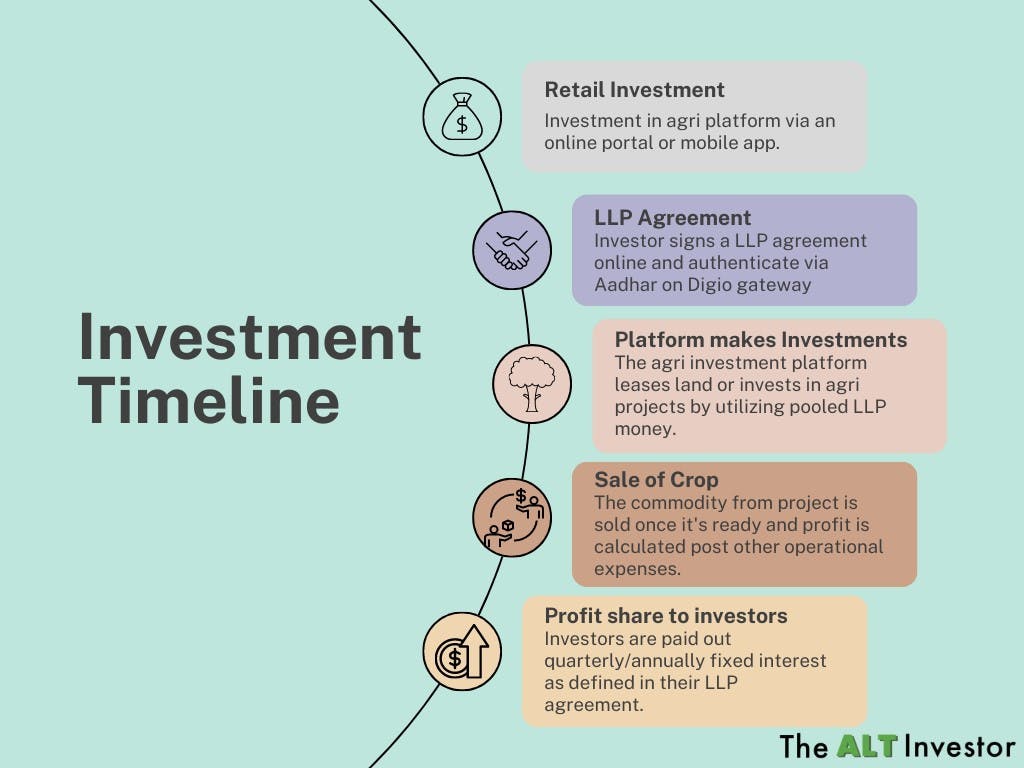
Good things about this scheme
First and foremost is diversification. It gives you exposure to asset classes that you generally wouldn't get as a retail investor.
Tax-Free returns! If you are an investor who has a good amount of investment in asset classes that attract tax on gains, you can consider this asset class. I wouldn't term high return as a good thing as high returns are always coupled with high risks!
Risks you should be aware of
Regulatory Risk: The structure mentioned above closely resembles a CIS (Collective Investment Scheme), but it is not one and is not regulated by SEBI or RBI. Instead, this investment is made into an LLP and will be governed by the dispute resolution mechanism established by the RoC (Registrar of Companies). In contrast, a CIS must be rated by Indian rating companies and registered with the RBI.
💡One of the founders of a famous agri-investment platform defended the use of LLP by suggesting that in an LLP, 60% of partners' consent needs to be taken before any major decision is taken like if the LLP takes a loan or leases new land, etc. This is untrue, I was part of this LLP and there is no such mechanism where they seek permission. The real reason they avoid CIS is the regulatory scrutiny and the extra step to get their assets rated where most scrutiny can happen.Weather Risk: Farming is not easy; we have all heard of farmers' suicides due to the loss of their crops from extreme weather events. These agri-investment platforms claim to use superior technology and prediction algorithms to mitigate this risk, but they cannot provide proper evidence. Therefore, you need to be cognizant of that.
Policy Risk: Recently, the Government of India banned the export of rice due to a significant increase in its price. In this scenario, if your agri-investment was in rice crops and you were expecting a 30% return through exporting, you would no longer be able to achieve that. Instead, you would have to settle for a lower return, as you wouldn't receive the same price in the domestic market. Some platforms mitigate this by diversifying their portfolio of agri-products.
Liquidity Risk: Though some platforms claim to offer instant liquidity, it's important to understand that agricultural produce follows a cycle from sowing to harvesting and finally selling. This cycle cannot be fast-tracked. Platforms may attempt to mitigate this risk by diversifying their portfolio of agricultural projects, but you must evaluate whether they would be able to meet liquidity in stressed scenarios.
Most Important: Things to ask from your agri-investment platform
What happens to your invested amount if the LLP faces a loss, how will they still honor the fixed interest mentioned in the LLP agreement?
📰If the platform claims you will not be liable for loss, will the LLP agreement say so?Since you are a partner in the LLP, do you have access to all financial transactions of the LLP?
Can you physically visit ALL farms/agri-projects and see the technology they claim to have? If not, can they share the official rent agreements for such land?
😰I have emphasized all farms as some platforms will allow you to visit only certain farms which they manage but claim to have thousands of acres under cultivation.Can they see any paid invoices or evidence of agri-crops against any purchase orders they might have received from a 3rd party?
🤯We have seen evidence of certain platforms which have raised/shared fake invoices on certain invoice discounting platforms to raise money.What is their dispute resolution mechanism within the LLP you will be a partner of? Which jurisdiction will this be solved in? Is this mentioned in the agreement you sign?
If the investment is via LLP, in which cases would they consult existing partners to make decisions on behalf of LLPs?
How did the founder enter this industry, do they have prior experience or did they take any help from experienced consultants to set this up? Check their history.
Ask for their audited financial statements, try and assess whether their statements make sense of the scale they claim they have.
Ask for a formal full LLP agreement to be sent to you via courier so you have a physical copy. If they deny doing this, consider it as a red flag.
Current Agri-Investing Platforms
- Growpital (I don't recommend this platform, detailed article to follow on all red flags, but the above questions should help you get started)
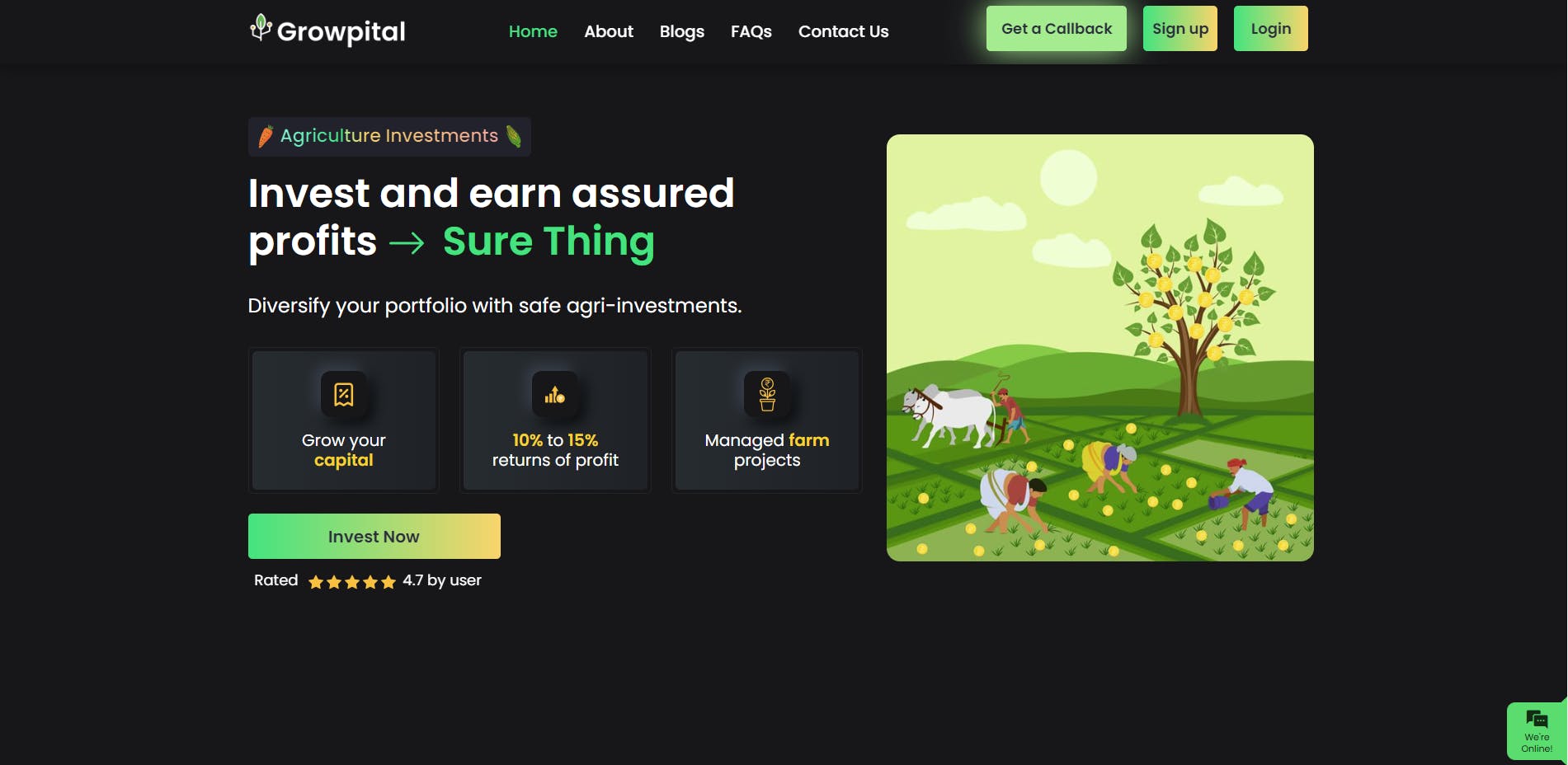
- FAAB Invest does not raise funds continuously as Growpital does, they raise small sums of money (their max investment has been 1.35 crores) for designated projects and create an LLP for each project. They also offer liquidity within 30 days with full return of capital after deducting a 2000 admin fee. We have written an extensive piece on this company which you can read in this blog.
- FarmChakra, not sure if this company is still accepting investments as their Invest Now button on the website doesn't work but it is in the same domain.

- Kisaan Parivar: Again no solid details on how investments are made, highly questionable model with a minimum ticket size of roughly 12.45 lakhs. They apparently also offer CCDs to investors promising a 24% return. Not sure how will they sustain that. If you want to read more about CCDs, you can read here.
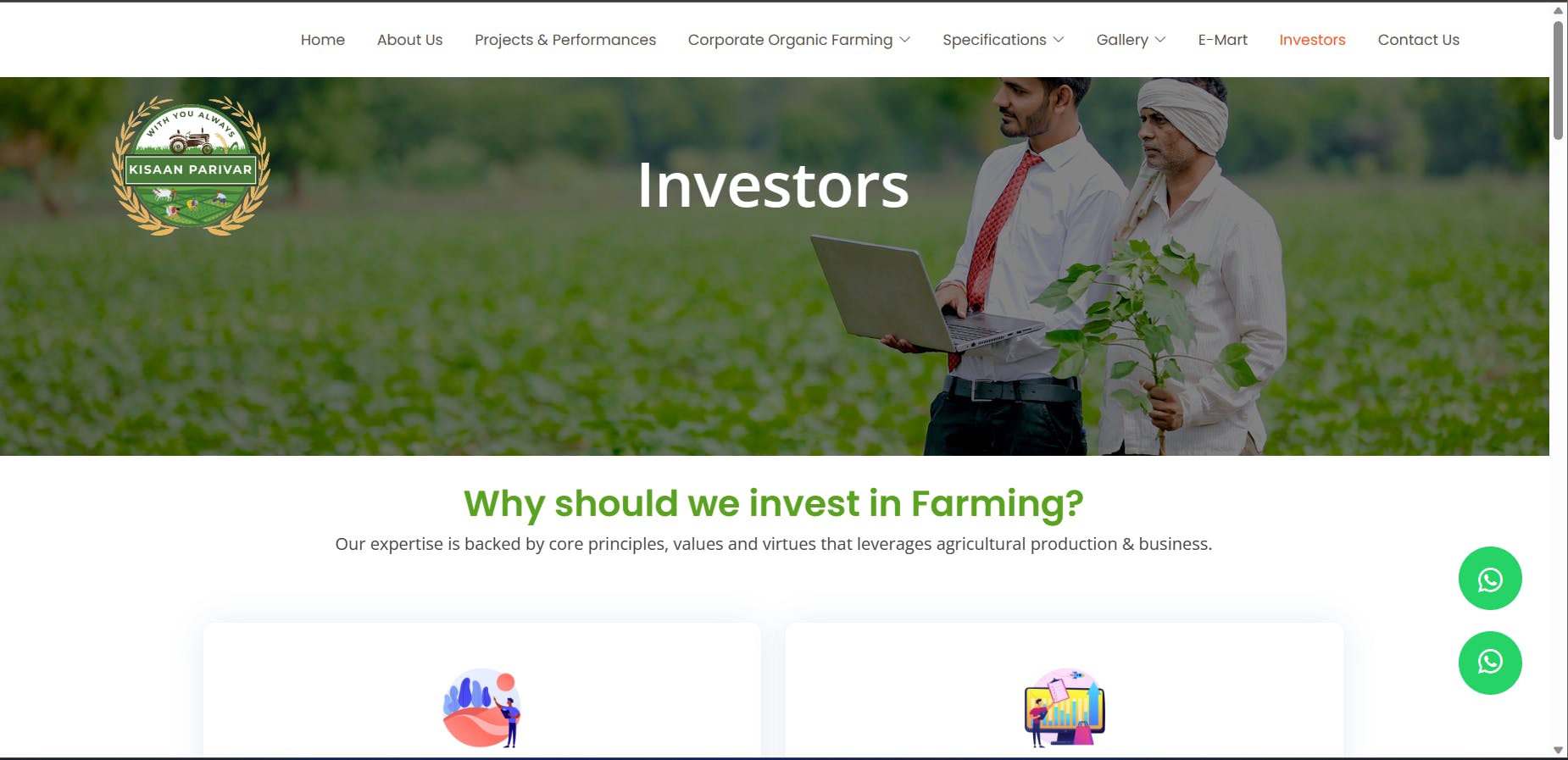
If there are any other platforms that I haven't covered, please message me here or comment on the article and I will add them.
Bottom Line?
Well, the bottom line is do not in any case invest blindly (like I did) seeing a high tax-free return! There are no free lunches, if it's too good to be true, it probably is.
Please please ask the relevant questions mentioned above and only invest in these platforms if it makes absolute sense for you to do so, otherwise there are other alternative investment opportunities with better risk-return profiles.
Hope you enjoyed the article, if you think there is something factually incorrect or if you know of any other platforms offering agri-investment for retail investors, please send me a message here or email me at yash@thealtinvestor.in
Please note that this is an opinion blog and not official research advice. I am not a registered RIA in India, and none of these views reflect those of my current employer. This blog aims to promote informed decision-making and does not discourage you from investing in any deals.
We plan to come up with more blogs discussing different types of instruments available in the world of startup investing, write on due diligence for some platforms, and also existing and upcoming alt investment deals in the Indian market. If you want to stay updated on the latest blogs, please subscribe to our newsletter so you get notified automatically, if you are a Tradewithpython subscriber, you know we don't spam.
Lastly, if you like our work, please feel free to sponsor us via Hashnode Sponsors or Buy me a Coffee by clicking here or the button below. And if you would like to speak to me or get my opinion on anything related to investments/finance/algotrading, schedule a call with me on Topmate.io by clicking the below image.
Thank you for reading and hope to see you in the next one!

